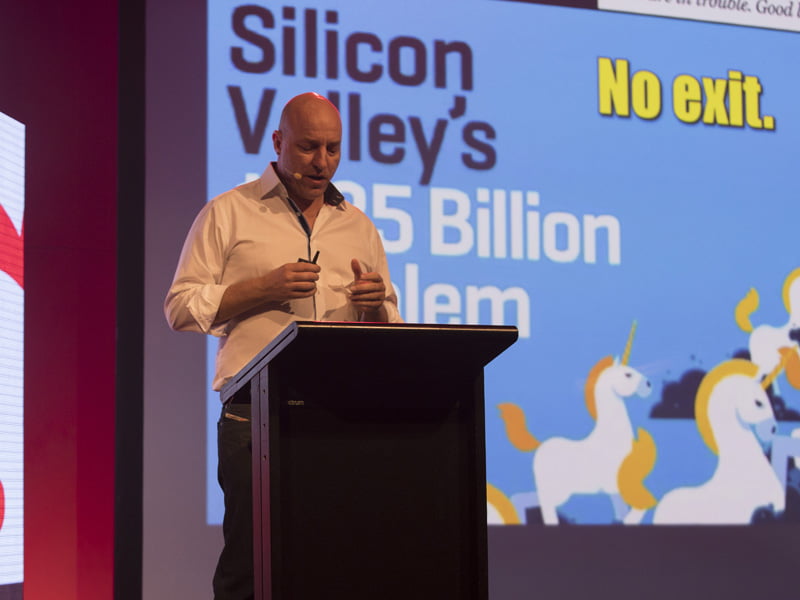Pound for pound the Australian tech sector is producing better startup operators than its counterpart ecosystem in Silicon Valley, according to Freelancer.com’s acerbic CEO Matt Barrie. But that doesn’t mean everything’s hunky dory.
Speaking on the sidelines of the huge StartCon startup event in Sydney on Sunday, Mr Barrie says the industry in Australia has never been more alive with activity than it is right now.
But its challenges remain entrenched, and government is moving too slowly to fully capture the opportunities on offer or to avoid the downside risk of not building the nation’s tech capacity.

Here’s the thing about Matt Barrie. Even when the going has never been better, even as the CEO/organiser presiding over the biggest startup event evet held in Australia, he’s going to lament why the industry can’t bigger, and why government can’t be better.
This is what makes him interesting, of course. But it is also a common view in StartupLand. There is no-one suggesting that the startup sector in Australia is even remotely close to its zenith. The ride has only just started.
So with four floors of the Royal Randwick race course filled with Startcon stages and exhibition space, Mr Barrie allows himself a few moments to reflect on the quality of the Australian startup sector, before moving to more familiar territory (wherein he points out the problems that are holding us back.)
“Right now the startup scene is absolutely buzzing,” he says. The industry in Australia is alive with the kind of activity not seen since 2000/01. “There are so many people who are involved with startups, or who want to get involved.”
“The whole entrepreneur thing is through the roof. And the quality [of our people and companies] is at the next level.”
That’s the Matt Barrie pound-for-pound argument. Australia’s top tech companies – the stand-outs – have better founders and our companies are battle-hardened and more adjusted to both survive and thrive (depending on the circumstances of the moment.)
“Because the funding environment [in Australia] has been traditionally quite woeful, the companies that have come out the other side have operators who are really quite fantastic,” Mr Barrie said.
He’s talking about the likes of Mike Cannon-Brookes and Scott Farquhar from Atlassian, or Envato’s Collis Ta’eed, and Kogan.com’s Ruslan Kogan. There are others.
“They are people that raised money from the best place possible – by selling something useful to customers. They are a lot more disciplined, and they are much better operators pound for pound than their Silicon Valley counterparts,” he said.
“In Silicon Valley, startups have the luxury of being able to go out and raise huge money – billions of dollars – while Aussie companies have [achieved their success] on the smell of an oily rag.”
“And that ultimately means that we produce better operators.”
Mr Barrie says despite Malcolm Turnbull having gone quiet on innovation messages since the election, there has been good reason to be optimistic about the Prime Minister’s innovation policy agenda.
But there has got to be more. Policy remains at the edges rather than central.
The National Innovation and Science Agenda was well received, if a modest undertaking. The added incentives for investors is welcome. The crowd-sourced funding arrangements are getting closer to becoming a reality. R&D tax changes look good.
But it’s still around the edges.
“Really these are small changes compared to where we need to be,” Mr Barrie said.
“If we really want the technology sector to really contribute meaningfully to the national economy, it can’t just be lip-service policy, it has to be a re-orientation,” he said.
“We need to look at this like a Manhattan Project or the Space Program in the US, or do what Israel did. It has to be the whole of the country saying ‘we need to do this’.”
“Right now it’s a bit of a mess.”
Which brings us to the industry groups and politics. Matt Barrie has not been directly involved in tech industry groups, saying they are largely a waste of time.
He’s not much interested in whether amalgamating some of the many disparate industry groups might create a more powerful lobby.
He is much more interested in the tech sector getting politically organised. The sector won’t get the policies to drives the industry until it is running candidates at elections.
His other specific political interest right now is on the reform of Section 64c of the Constitution. That’s the bit that says Ministers must be elected representatives – either from the House of Representatives or the Senate.
Mr Barrie says we should be looking to the US as a model, where the Cabinet can be appointed from the private sector – rather than only from the more limited gene pool of elected officials.
Indonesia has a similar set up, where President Joko Widodo appointed as Ministers a team from the private sector with particular skills that suited the portfolio.
Indonesian Trade Minister Thomas Lembong had never spent any time in politics before being appointed to the role after a career in merchant banking and private equity, just as Communications Minister Rudiantara was appointed to the role straight from a 25 year careers running telcos.
“In Australia, [the Prime Minister] has to choose between career hack politicians and [elected] lawyers to run all of these different cabinet positions,” Mr Barrie said.
“Can you imagine trying to run a company where you have to choose your VP of Engineering from a pool of lawyers?”
“This country has some fundamental problems in terms of the way that it’s governed,” he said.
Do you know more? Contact James Riley via Email.

